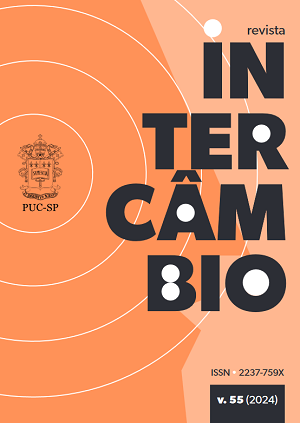The Double
notes on Knowledge and Power in Persona by Bergman
DOI:
https://doi.org/10.23925/2237-759X2024V55e66449Keywords:
persona, silence, knowledge, power, discursive studiesAbstract
In this essay, we show the implications of silence in its relation to power in the film Persona by Ingmar Bergman (1966). We assume that silence works, in the work, as an update of forms of power and resistance in the lines of force that compose the relationships between the characters. To this end, we draw on some theoretical-methodological assumptions of Foucaultian discursive studies. The importance of this study lies in relativizing the idea that power silences, showing that, in times of hegemony of extraction of surplus value from symbolic activities, power makes people speak. The highlights show us that those who speak make-know and, at the same time, those who are silent may not-make-know and may still make-not-know. We conclude that power hides in the potentiality that develops in the sheet of silence. Knowledge is the very actualization of what is heard and what is seen, an actualization that generates the potentiality of power to those who see and hear.
References
ARISTÓTELES. Política. Edição bilíngue. Trad. António Campelo Amaral e Carlos Gomes. Lisboa: Veja Universidade, 1998.
BARTHES, R. Aula. Trad. Leyla Perrone-Moises. São Paulo: Cultrix, 1997.
BENVENISTE, E. Problemas de linguística geral. Trad. Maria da Gloria Novak e Maria Luisa Neri. São Paulo: Nacional/ EDUSP, 1, 1976.
FLOCH, J. M. A contribuição da semiótica estrutural para o design de um hipermercado. Galaxia (São Paulo, Online), 27:21-47, 2014.
FOUCAULT, M. Arqueologia do saber. Trad. Luiz Felipe Baeta Neves. Rio de Janeiro: Forense Universitária, 2008.
FOUCAULT, M. História da sexualidade 1: a vontade de saber. Trad. Maria Thereza da Costa. Albuquerque e J. A. Guilhon Albuquerque. São Paulo: Paz e Terra, 2014a.
FOUCAULT, M. Vigiar e punir: nascimento da prisão. Trad. Raquel Ramalhete. Petrópolis: Vozes, 2014b.
FREUD, S. O mal-estar na civilização. Trad. Paulo Cezar de Souza. São Paulo: Penguin-Companhia das Letras, 2011.
GRACIANO, D. P. Altersemiose: o problema da expressão em uma novela de Italo Calvino. Leitura, 72: 106–117, 2022.
HEIDEGGER, M. A linguagem e o ser. In: HEIDEGGER, M. Carta sobre o humanismo. Trad. Rubens Eduardo Frias. São Paulo: Centauro, 2005.
JUNG, C. G. Os arquétipos e o inconsciente coletivo. Vol. 9/1, 11 ª.ed. Trad. Maria Luiza Appy e Dora Ferreira da Silva. Petrópolis: Vozes, 2018.
PERSONA. Direção de Ingmar Bergman. Produção de Ingmar Bergman. Estocolmo: Svensk Filmindustri Studios, 1966. 1 DVD.
ROSSI-LANDI, F. A linguagem como trabalho e como mercado: uma teoria da produção e da alienação linguísticas. Trad. Aurora Fornoni Bernardini. São Paulo: DIFEL, 1985.
SONTAG, S. A vontade radical. Trad. João Roberto Martins Filho. São Paulo: Editora Schwarcz Ltda., 1987.
SPINOZA, B. Ética. Edição bilíngue. Trad. Tomaz Tadeu. Belo Horizonte: Autêntica, 2017.
VIRNO, P. Virtuosismo e revolução: a ideia de “mundo” entre a experiência sensível e a esfera pública. Trad. Paulo Andrade Lemos. Rio de Janeiro: Civilização Brasileira, 2008.
Downloads
Published
How to Cite
Issue
Section
License
Copyright (c) 2024 Daniel Perico Graciano

This work is licensed under a Creative Commons Attribution 4.0 International License.






